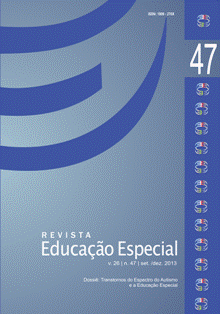Comunicação alternativa para alunos com Autismo no ensino regular
DOI:
https://doi.org/10.5902/1984686X9689Palabras clave:
PECS adaptado, Formação de professores, Inclusão.Resumen
http://dx.doi.org/10.5902/1984686X9689
O presente artigo descreve uma das etapas de um projeto de Comunicação Alternativa para alunos com autismo no contexto escolar na rede municipal de ensino do Rio de Janeiro. Tem como objetivos relatar e discutir as necessidades e os desejos dos professores que atuam nas salas de recursos oferecendo o AEE – Atendimento Educacional Especializado, e que participam do processo de inclusão de alunos com autismo. Os professores receberam um curso de formação teórico-prático sobre o emprego do PECS-Adaptado, um sistema de Comunicação Alternativa que funciona por intercâmbio de figuras e que é especialmente destinado a tal alunado. Os participantes foram questionados ao final do curso sobre suas necessidades e seus anseios relativos à utilização desse recurso em sala de aula na escola regular. Os resultados mostraram que a maioria dos professores apresenta intenção de se comunicar melhor com seus alunos, expressando, contudo, necessidade de suporte de professores especializados e participação ativa de todos os envolvidos no processo de inclusão. Consideraram ainda que a Comunicação Alternativa deve ser introduzida inicialmente na sala de atendimento especializado e, posteriormente, na sala de aula regular.
Descargas
Descargas
Publicado
Cómo citar
Número
Sección
Licencia

This work is licensed under a Creative Commons Attribution-NonCommercial 4.0 International (CC BY-NC 4.0)
DECLARAÇÃO DE ORIGINALIDADE E DIREITOS AUTORAIS
Declaramos o artigo a ser submetido para avaliação na Revista Educação Especial (UFSM) é original e inédito, assim como não foi enviado para qualquer outra publicação, como um todo ou uma fração.
Também reconhecemos que a submissão dos originais à Revista Educação Especial (UFSM) implica na transferência de direitos autorais para publicação digital na revista. Em caso de incumprimento, o infrator receberá sanções e penalidades previstas pela Lei Brasileira de Proteção de Direitos Autorais (n. 9610, de 19/02/98).







